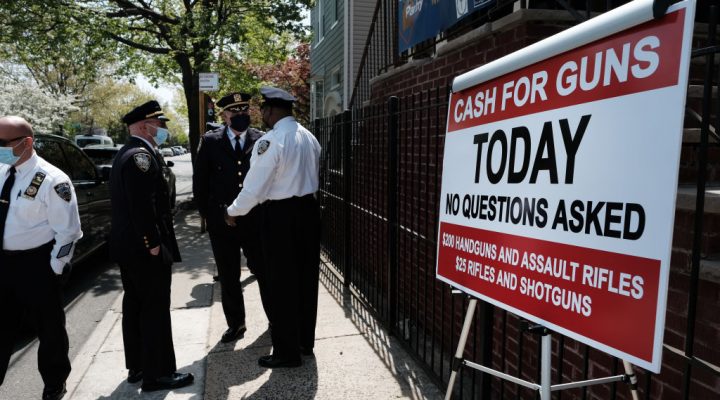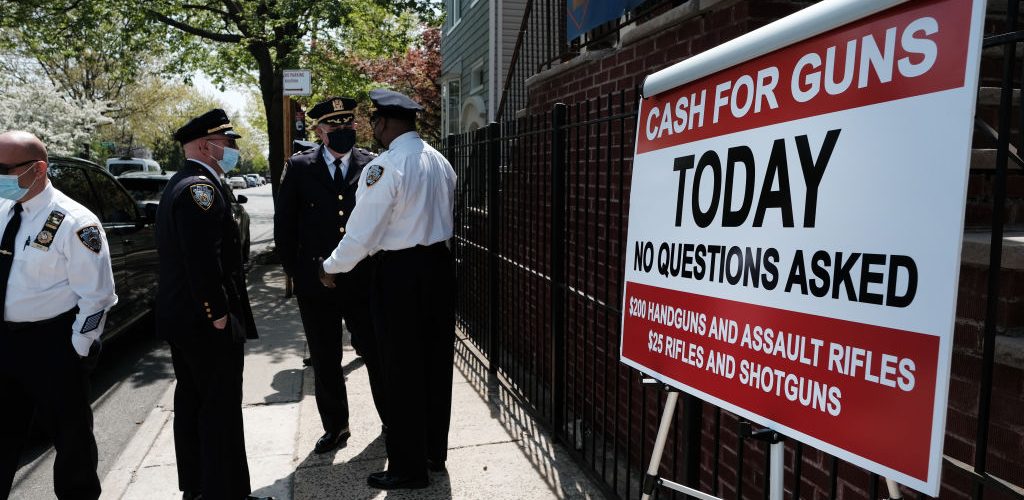Concerned about rising gun violence, St. David’s Episcopal Church outside Detroit hosted a gun buyback in December so residents could trade firearms for gift cards.
“We’re trying to help build a safer community,” explained Chris Yaw, the church’s rector. “Guns are the No. 1 cause of death for kids. You’re drastically likely to take your life with a gun if you own one, and most gun crime is committed with stolen guns.”
So, Yaw was astonished to learn the 224 guns exchanged at St. David’s would not be destroyed by Michigan State Police as expected. Instead, those guns and firearms from other buybacks would be repackaged and resold online, contributing to the very violence St. David’s hoped to stop.
While guns themselves remain a divisive political issue, 67% of Americans support buyback programs for unwanted guns.
Gun buybacks are popular with churches looking to minister to their communities. They are low-cost, low-commitment and easy to organize with the help of local law enforcement. For their part, police departments need neutral locations like church parking lots to reach at-risk individuals reluctant to trade in a gun at a police station.
To dispose of a gun, the Bureau of Alcohol, Tobacco, Firearms and Explosives (ATF), instructs individuals to saw guns into pieces or “completely melt (smelt), shred or crush the firearm.” However, Mike Martin, founder of RAWtools and a blacksmith who turns unwanted guns into garden tools, explained the catch in the definition of “firearm.”
“The part of the gun that is defined as the firearm is the receiver. The receiver is what has the serial number, and all the other parts of the gun connect” to it, he said.
In the past, law enforcement officers cut up unwanted guns themselves or had them melted down at foundries. But a recent New York Times investigation revealed state and local police departments now depend on private companies to dispose of guns collected at buybacks.
Rather than destroying the entire gun, as the ATF intended, these disposal companies disassemble the gun, crush only its receiver (the “firearm”), and then resell the remaining barrel, trigger, grip, slide, stock and springs in a gun kit. With a new receiver and help from YouTube, people who buy these kits can easily assemble what the ATF refers to as a “privately made firearm.”
The largest private company for gun disposal is GunBusters, whose patented Firearms Pulverizer has crushed more than 200,000 guns donated from 950 police agencies across the country. Founder Raymond Reynolds drew from his experiences as a police officer and later salesman for gun manufacturers Glock, Beretta and Sir Sauer to create GunBusters.
Reynolds also owns another company, PoliceTrades, which negotiates sales and trades between law enforcement agencies and gun dealers.
To purchase the gift cards that would be exchanged for guns, St. David’s raised close to $20,000 “to make sure that everybody who came in and waited in line was able to get some money for their guns,” Yaw said.
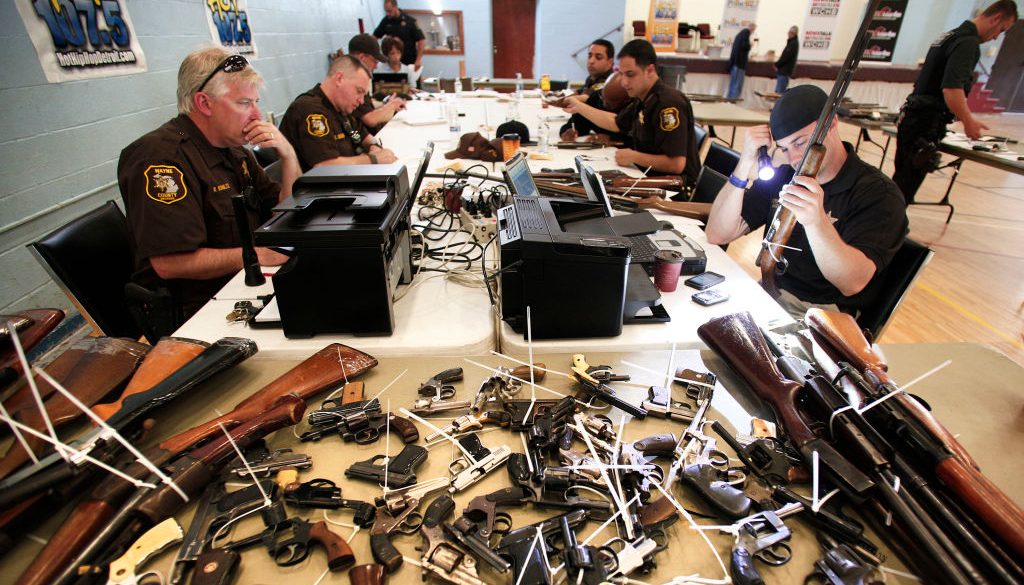
Wayne County Sheriff’s officers examine and enter into a database guns people brought in to exchange for a $50 Meijer gift card at a “Groceries For Guns” gun buyback program May 18, 2013, at the New St. Paul Tabernacle Church of God in Christ in Detroit, Michigan. The event was sponsored by the law firm Goodman Acker P.C. in a public-private partnership with Wayne County. (Photo by Bill Pugliano/Getty Images)
The local board of commissioners provided another $10,000 toward the church’s gun buyback from its Safer Communities Fund. That money was designated to pay for police overtime and other expenses, with the understanding that the guns “would be destroyed,” Chairman Dave Woodward said.
Because the returned guns instead were donated to GunBusters, which profits off their resale, the church’s $20,000 and the tax money allocated by the local commissioners essentially subsidized the company.
Selling gun components is necessary to fund the destruction of the receivers, Gunbusters President Scott Reed said. “Our services are free for law enforcement agencies,” he noted. “If we can’t cover our costs by selling parts, then we charge them.”
GunBusters also charges an additional fee if agencies decide they want the entire gun destroyed. In an unfortunate choice of metaphor, Reed compared the resale of gun components to “organ donation” because gun collectors can find the spare parts needed to repair old firearms.
Because gun kits are “components” and not whole guns, buyers are not required to undergo background checks, even in states that have otherwise closed the “gun show loophole.”
But historic gun aficionados do not account for the $90,000 in sales GunBusters and its five licensees average a week in their combined online sales of disassembled gun kits. These kits have all the parts necessary to create a gun except for the receiver. They cost anywhere from $100 to $1,000.
A Colt AR-15 kit sold online at auction for $2,175 on the website Gunbroker, where GunBusters made more than $290,000 in three weeks.
Because these are “components” and not whole guns, buyers are not required to undergo background checks, even in states that have otherwise closed the “gun show loophole.” This means nothing can stop minors, felons, domestic abusers, gun traffickers, fugitives and other prohibited purchasers from buying a kit and assembling it.
In order to assemble a kit made from gun buyback parts, a buyer only needs to replace the missing receiver. Exploiting a loophole in ATF guidelines, these receivers also are sold in easy-to-assemble kits, often including templates, instructions and even drill bits.
A buyer assembling a Glock-style pistol receiver produced by the company Polkymer80 only needs to drill three holes and remove four plastic tabs before dropping in the parts from a GunBusters’ kit. A kit purchaser also can manufacture a receiver using a 3-D printer or computer-controlled milling machine and then add the gun components.
Unless they sell them for profit, people who assemble these “privately made firearms” from kits are not required to register them. That loophole has earned these untraceable weapons the nickname “ghost guns.”
Ghost guns are popular with criminals because they are easy to acquire and untraceable. In 2022, the U.S. Justice Department seized 25,785 ghost guns in the United States and close to 2,500 internationally.
Ghost guns are especially popular with criminals because they are easy to acquire and untraceable. In 2022, the U.S. Justice Department seized 25,785 ghost guns in the United States and close to 2,500 internationally.
President Joe Biden and the Justice Department issued a rule that same year reclassifying ghost guns kits as firearms. Groups of gun owners, gun-rights organizations and gun manufacturers challenged the rule, which recently was declared “unlawful” by the 5th U.S. Circuit Court of Appeals in New Orleans.
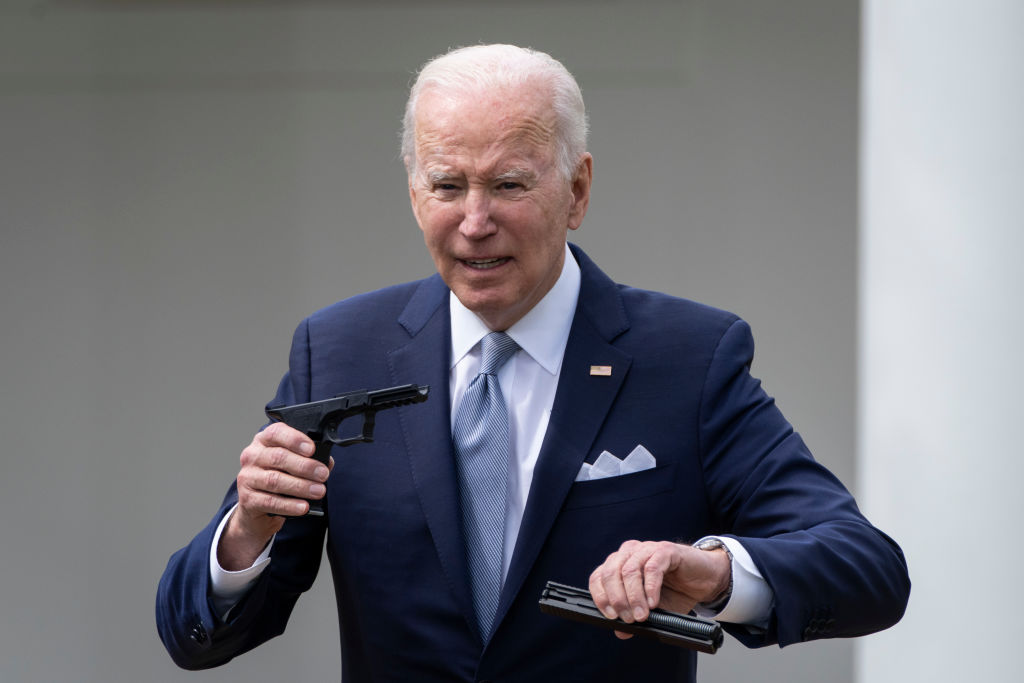
U.S. President Joe Biden holds up a ghost gun kit during an event about gun violence in the Rose Garden of the White House April 11, 2022 in Washington, DC. Biden announced a new firearm regulation aimed at reining in ghost guns, untraceable, unregulated weapons made from kids. Biden also announced Steve Dettelbach as his nominee to lead the Bureau of Alcohol, Tobacco, Firearms and Explosives (ATF). (Photo by Drew Angerer/Getty Images)
Nine States have laws prohibiting police departments from destroying seized or surrendered guns and outdated service arms. Instead, law enforcement departments in North Carolina, Arizona, Georgia, Kansas, Montana, North Dakota, Tennessee, West Virginia and Kentucky must trade in or sell guns in their possession.
Former Police Chief Catrina Thompson of Winston-Salem, N.C., was reluctant to sell the department’s guns and see them return to the streets. “We’ve seized a thousand guns a year for the last three years,” she said. “We have storage facilities, but we’re about to run out of space.”
The state’s House speaker, Tim Moore, feels differently and sees no conflict with police departments reselling seized guns. “The gun didn’t break the law,” he said. “It was the person who had the gun who broke the law.”
Very few guns recovered in buybacks are stolen or linked to crime. Most are broken or disused guns that owners have replaced with newer models.
While guns in the home are dangerous to children and those struggling with mental health issues, they are less of a risk to the community at large. But sales of gun kits made from component parts of donated guns place these once-dormant firearms back into the public domain. Instead of getting guns off local streets, gun buybacks are inadvertently arming communities across America.
“The vast majority of those people who gave us those guns did so trusting they were going out of circulation,” Yaw said. “‘Out of circulation’ does not mean recycled and repurposed. People donated these guns to make our community safer, not to make a corporation richer.”
After the New York Times published its story about the secondary arms market created by gun buybacks, GunBusters offered to fully demolish the guns collected at St. David’s Episcopal Church.
“While we are appreciative of this gesture, which costs more than $15,000 retail, we are concerned about the fate of more than 11,000 guns that Michigan sends to GunBusters every year,” Yaw said.
RAWtools has a different approach to reselling surrendered guns by transforming them into garden tools. Volunteers in the organization’s Disarming Network publicly dismantle unwanted guns in front of the people who donate them.
“When we destroy a gun, we are doing it with it fully assembled, meaning we are cutting through the parts connected to the receiver as well. This leaves mostly the barrel and stock or handle of the firearm left for us to make garden tools, jewelry and art from,” Mike Martin said. “Moreover, the cuts are made in ways that the parts left over are not able to be resold for used in another firearm or kit without them being re-machined at a cost higher than simply buying a new one.”
Blacksmiths supported by RAWtools then refashion the pieces into items to sell in the nonprofit’s online store. Proceeds from the store support other organizations working to prevent suicide and gun violence.
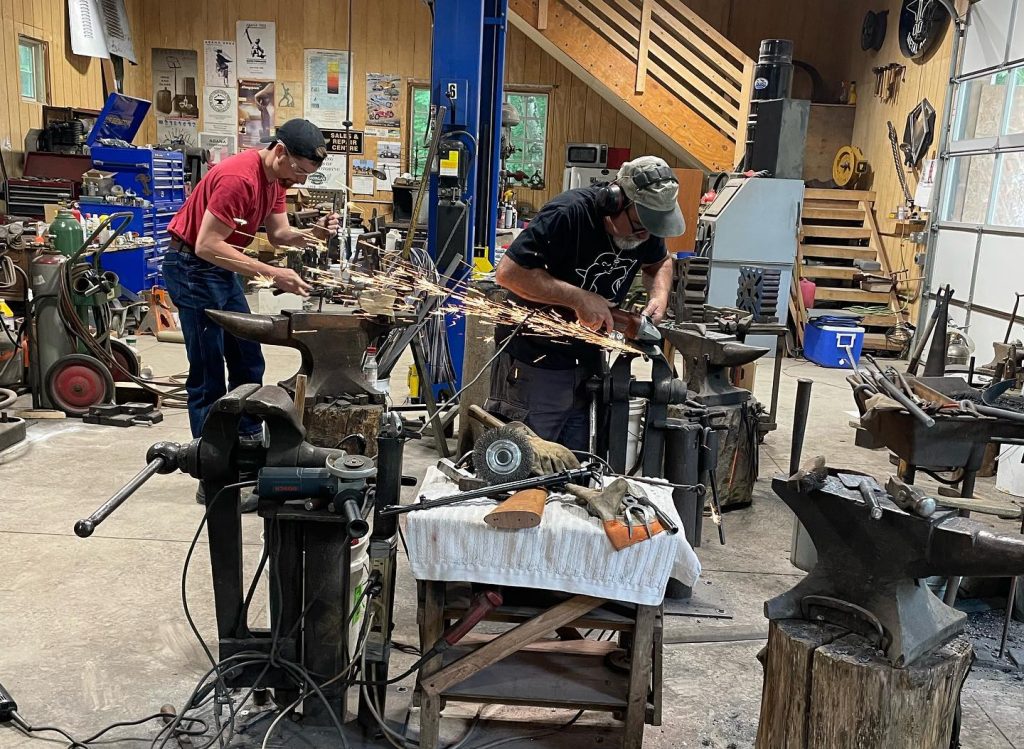
Photo/RAWtools Facebook page
In addition to transforming guns into garden tools, RAWtools also transforms communities by offering workshops on topics such as restorative justice, violence de-escalation and bystander intervention. They also assist churches with gun buybacks and other events.
“We love working with faith communities because it allows this conversation to find a home outside of politics and rooted in faith,” Martin said. “We can offer a whole new conversation about gun violence when we root it in faith commitments.”
Martin co-wrote a book, Beating Guns: Hope for People Who Are Weary of Violence, with activist Shane Claiborne.
“There is a lot to consider when partnering with our work,” Martin said. “We’d be happy to help communities find what’s best for them.” Churches may contact RAWtools at [email protected].
St. David’s Episcopal Church is planning another gun buyback this spring, but revelations about gun disposal companies such as GunBusters has made determining how to proceed unclear.
“Our society is set up really well for buying and selling guns, but it’s not set up very well for disposing of them,” Yaw acknowledged.
Kristen Thomason is a freelance writer with a background in media studies and production. She has worked with national and international religious organizations and for public television. Currently based in Scotland, she has organized worship arts at churches in Metro D.C. and Toronto. In addition to writing for Baptist News Global, Kristen blogs on matters of faith and social justice at viaexmachina.com.
Related articles:
Worshiping guns, weaponizing God
I’m a gun owner, and I believe drastic changes are needed now

